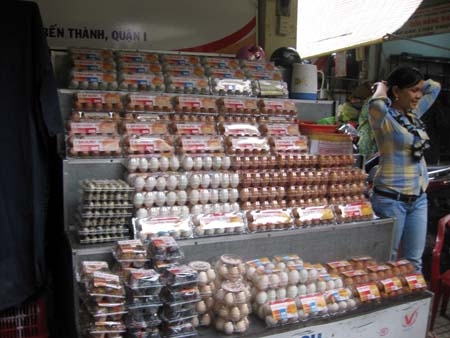 Economy
Economy

Eggs, both fresh and processed, such as salted eggs and balut, are no longer required to undergo quarantine as of mid-August if they are sold in the domestic market. Quarantine is still required for eggs being exported.
 |
| An egg stall in HCM City’s Bến Thành Market. Eggs are no longer required to undergo quarantine as of mid-August. — VNA/VNS Photo |
HÀ NỘI — Eggs, both fresh and processed, such as salted eggs and balut, are no longer required to undergo quarantine as of mid-August if they are sold in the domestic market.
Quarantine is still required for eggs being exported.
This was announced in a circular issued by the Ministry of Agriculture and Rural Development on animal quarantines, aiming to reduce administrative procedures.
Egg suppliers will take responsibility for the quality of their products, and government agencies will perform inspections and issue penalties if violations are detected.
People, however, are concerned about unqualified eggs being sold in the market, particularly those carrying diseases that threaten human safety and wellbeing.
Head of HCM City’s Animal Health Department Phan Xuân Thảo warned of the high risk of avian influenza when the circular takes effect, as local authorities would lose control over eggs and egg products.
The Tiền phong ( Vanguard) newspaper reported that egg firms were not happy with the quarantine removal because in order to supply “qualified” eggs to the market, they had invested billions of Vietnamese đồng in equipment and technology.
An owner of an egg firm in HCM City told the newspaper that he had bought egg-processing equipment worth VNĐ2 billion (US$90,000).
“Eggs that are processed, packed and labelled before entering the market are usually VNĐ200–300 more expensive than unprocessed or unpacked eggs,” he said.
“Without a quarantine certificate, consumers are likely to take for granted that all eggs are the same and safe for human consumption,” he said, adding that consumers would pay more attention to price.
An egg seller on Phú Hữu Street, District 5, assumed that there is now no difference between quarantined and non-quarantined eggs, allowing her to reach out to farms to buy eggs and retail them.
Another retailer in Bà Chiểu Market, Bình Thạnh District, said that previously, she had to buy eggs from wholesalers or agents at Levels 1 or 2 to ensure that the eggs were quarantined.
She said she had paid a wholesaler VNĐ2,200 for an egg that was originally priced at VNĐ1,700.
Moreover, she previously had to pay a small amount of money for each egg to be quarantined and granted a certificate.
She said she also felt annoyed when animal health officials arrived at her stall every morning to collect the quarantine fee.
Nguyễn Thị Hòa, a farm owner in southern Đồng Nai Province, said that without the quarantine, she could bring her eggs to HCM City for direct sale instead of going through wholesalers and brokers.
Previously, the government had intervened in controlling egg quality as farms usually operated on a small scale without any quality management programmes. But for the last decade, farms have been able to meet the requirements for quality, so the government’s intervention is unnecessary anymore, according to Hòa.
She said egg quarantine removal would help lower egg prices and that consumers could now buy cheaper eggs. — VNS